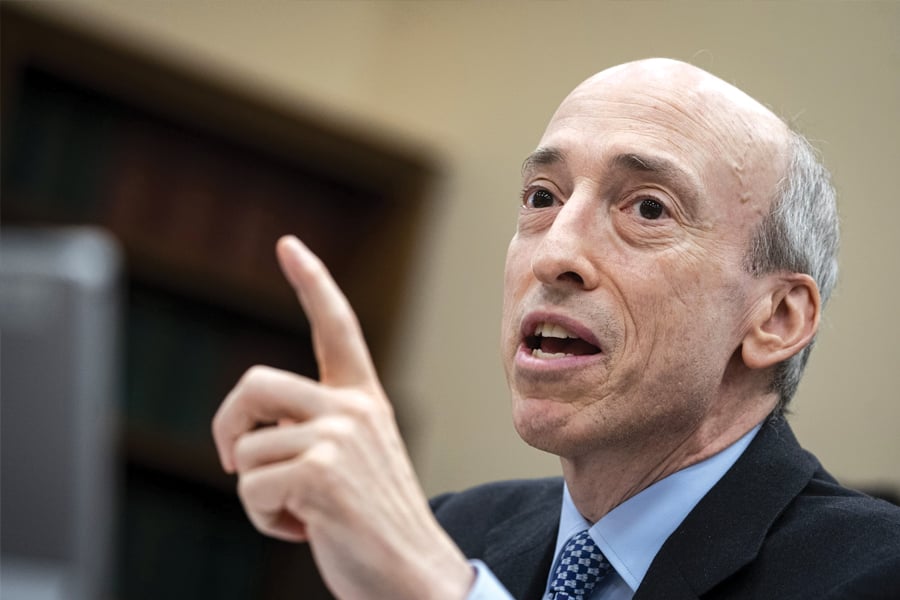

An SEC proposal targeting potential conflicts of interest for financial advisors using artificial intelligence is not meant as a way to modify Regulation Best Interest, Chair Gary Gensler said Tuesday.
The Securities and Exchange Commission introduced a proposed rule over the summer that would require investment advisors and brokers to remediate conflicts related to interactions with investors conducted through artificial intelligence, predictive data analytics and similar technology.
Under the proposal, advisors and brokers would have to eliminate or neutralize conflicts that arise when an algorithm encourages an investor to purchase an investment product or follow a strategy that does more to increase the advisors’ revenues than the investors’ returns.
Concerns that the AI proposal is a backdoor means to add more conflict remediation to what’s already required under Reg BI — the broker-dealer standard of conduct that went into force in June 2020 — surfaced at the Securities Industry and Financial Markets Association annual conference in Washington Tuesday.
“Would it be fair to say you’re trying to make it consistent with what you would have to do under Reg BI, whether it’s an algorithm or [other] advice?” SIFMA CEO Ken Bentsen Jr. asked Gensler in a conference session.
Gensler assured him that was the case.
“Largely speaking, yes. We’re not trying to change Reg BI or change the fiduciary guidance,” he said, referring to the SEC’s interpretation of the fiduciary standard for investment advisors.
What the agency is trying to do is target a situation that occurs when predictive data analytics can “narrowcast” and engage in “microtargeting” investors on product, pricing and communications, Gensler said.
If an app or algorithm is programmed to “optimize [an advisor's] revenue or profits, it’s going to tilt the recommendations,” he said. “It’s going to tilt the communications. It’s going to put some people in margin accounts or options that you wouldn’t otherwise do. It’s that basic thing we’re trying to address.”
As he tends to do at industry conferences, Gensler challenged the audience, which was made up of SIFMA members who are brokerage firm leaders and other market participants. He asked for a show of hands to indicate how many people “think it’s right if the algorithm is optimizing on the profits or revenues of the investment advisor.”
After a brief pause, Gensler announced the results.
“The record shows nobody raised their hands,” Gensler said to light laughter.
Talking to reporters on the sidelines of the SIFMA conference, Gensler elaborated on what is meant by the AI proposal’s directive for financial advisors to eliminate or neutralize conflicts.
“You should either take the investment advisor’s interest out of the algorithm or neutralize it,” Gensler said. “By neutralize, in essence, get to a place where the interests of the investors are ahead of the platform’s.”
How to achieve that outcome is open-ended.
“There are a number of ways to do it,” Gensler said. “We talk about that in the proposal but we’ve also received a lot of [public] comment and we’ll sort through that.”
The public comment period on the proposal has closed. It’s not clear when the SEC will take the next step in the rulemaking process.

Catch-up contributions, required minimum distributions, and 529 plans are just some of the areas the Biden-ratified legislation touches.

Following a similar move by Robinhood, the online investing platform said it will also offer 24/5 trading initially with a menu of 100 US-listed stocks and ETFs.

The private equity giant will support the advisor tech marketing firm in boosting its AI capabilities and scaling its enterprise relationships.

The privately backed RIA's newest partner firm brings $850 million in assets while giving it a new foothold in the Salt Lake City region.

The latest preliminary data show $117 billion in second-quarter sales, but hints of a slowdown are emerging.
Orion's Tom Wilson on delivering coordinated, high-touch service in a world where returns alone no longer set you apart.
Barely a decade old, registered index-linked annuities have quickly surged in popularity, thanks to their unique blend of protection and growth potential—an appealing option for investors looking to chart a steadier course through today's choppy market waters, says Myles Lambert, Brighthouse Financial.
